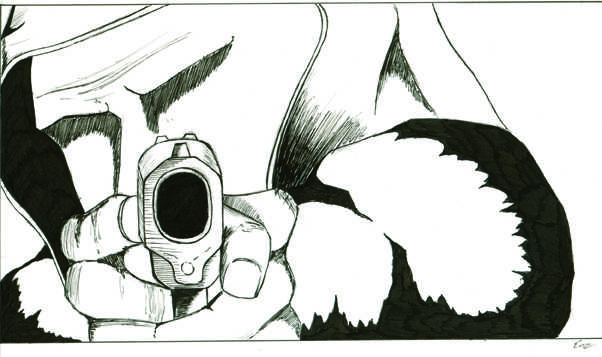Concealed weapons permits issued rises as result of ‘shall-issue’ gun legislation
Illustration: Eric Ensey/Iowa State Daily
Gun Laws Illustration
February 10, 2011
Imagine living in a time when all men carried guns snugly in their holsters, arguments were settled by simply drawing pistols and criminals were taken out with a single round.
Imagine the same scenes playing out at a Campustown bar or during a gas station holdup.
Although these scenarios might seem unlikely, they are possible under Iowa’s new “shall-issue” gun law. The law entitles almost anyone without previous commitment to a mental health institution or a serious criminal record to carry a concealed weapons permit.
Under Iowa’s former “may-issue” law, sheriffs had the discretion to refuse concealed weapons permits to applicants they felt were unfit.
Story County Sheriff Paul Fitzgerald has already run into problems with applicants who are under criminal investigation but have no current convictions.
“We also have an individual who is known to be an abuser in his home, but he has no criminal history, so we can’t deny someone we know to be violent a gun,” Fitzgerald said.
He also said a detailed written statement outlining why someone should not own a gun is now needed to refuse a permit.
“The sheriff no longer has any discretionary authority to issue permits,” he said. “I can deny it, but it has to be a very specific reason.”
Fitzgerald also said there has been a huge increase in the number of permits issued since the legislation became effective Jan. 1.
Story County Capt. Barry Thomas said a total of 429 permits were issued in Story County last year. The first month of the legislation almost matched this number, with 416 permits being issued in January alone.
Some businesses feel threatened by the upsurge in people who are now able to carry weapons. The sheriffs and police chiefs of several counties across Iowa are encouraging businesses to ban guns from their premises.
Ames has not yet seen this push, but it’s possible that Campustown properties and other local businesses will consider this ban.
The new law states that a concealed weapons permit does not become invalid until the carrier’s blood alcohol content reaches .08. This allows permit-holders to bring guns into bars while they’re drinking. The previous legislation had set no standards for alcohol consumption by weapons carriers.
Businesses with beer and liquor licenses might want to consider how they would regulate the consumption of carriers as a preventative measure, but many feel that the new law will prevent crime rather than spur it.
Robert Fowler, Des Moines resident and lobbyist for the Iowa Firearms Coalition, believes that although businesses should have the discretion to ban guns, he feels much better protected while carrying his.
“The police can’t always be there to protect you,” Fowler said. “Hopefully you’re not in that situation, but unfortunately it happens.”
Fowler said the “shall-issue” law is about fairness. By creating state-wide mandates on issuing gun permits, no one can be denied a weapon because of subjective reasoning.
“They still have the discretion they need, the only difference now is they have to tell you why and write up why they won‘t give you the permit,” he said. “There’s no more, ‘just because I said so,’ which is what they were doing before.”
Sen. Herman Quirmbach, D-Ames, voted for the bill when it reached the Senate last March. He recognized that the issue is controversial and reactions were greatly varied.
“It’s something of a trade off,” Quirmbach said. “In some counties, gun permits were all but impossible to obtain, and in other counties they were handed out like water.”







